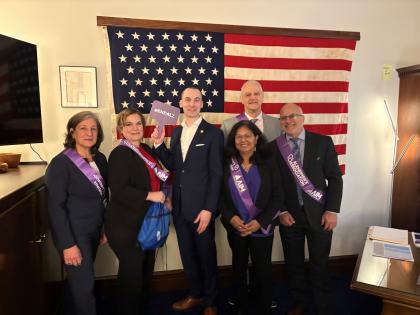Alaska State Alzheimer’s Plan Overview

In 2011, the Alaska Commission on Aging began the work of creating a state plan to address Alzheimer’s and dementia. With collaboration from other state agencies, community organizations, mental health professionals, and long-term care providers, the Commission formed a core team responsible for drafting Alaska’s response to Alzheimer’s. After collecting public input, Alaska’s Roadmap to Address Alzheimer's Disease and Related Dementias was published in December 2014. A subsequent plan entitled A Call to Action: Alaska’s 10-Year Map to Address Alzheimer’s Disease and Related Dementia was released in January 2021.
Alaska 2026 Policy Priorities

Ensure Direct Care Staff Have Dementia Training
A cornerstone of quality dementia care is ensuring that professional staff understand dementia and how to best meet the unique needs of individuals living with the disease. Currently, direct care workers, such as Certified Nursing Assistants, may have minimal dementia-specific knowledge limiting the ability to ensure quality care. The Alzheimer’s Association is urging state lawmakers to require the Board of Nursing to incorporate comprehensive dementia training for all direct care staff. This improved curriculum must include specific instruction on person-centered care, effective communication, activities of daily living and strategies for managing dementia-related behaviors.

Expand Access to Adult Day Services
Adult day and respite care services allow people living with dementia to remain in their homes for as long as possible while providing family caregivers much-needed support. Currently, 25,000 Alaskans serve as unpaid caregivers of individuals living with dementia, and only a portion of them have access to adult day services. These services provide daytime care, therapeutic activities and social engagement, while providing caregivers with a much-needed relief from caregiving duties. The Alzheimer’s Association is calling on state lawmakers to increase funding for Adult Day Care service grantees to $1,500,000 and incentivize additional dementia training. The increase in funding can help to establish 3-4 additional adult day centers serving families with dementia in underserved communities.
Alaska State Advocacy Day
Join advocates in Juneau on Tuesday, February 10, 2026 for State Advocacy Day! Advocates will come together and share their stories with state legislators to urge support for our critical policy priorities and improve the lives of people living with Alzheimer’s and other dementia. Don’t miss this chance to make a difference!
Sign Up to Learn About Advocacy Opportunities in Alaska

Find My Chapter
Together, we’re making an impact. Find an Alzheimer’s Association chapter in your community for more ways to engage.
Contact Us
State Affairs Contact: Arielle Wiggin
Phone: 907.313.2944
Email: arwiggin@alz.org
8,400
people living with Alzheimer’s in Alaska
25,000
Alaskans are providing unpaid care
$119 Million
Medicaid cost of caring for people living with Alzheimer’s (2025)
278.7%
increase in Alzheimer’s deaths 2000-2022
14%
in hospice with a primary diagnosis of dementia
90%
increase of geriatricians in Alaska needed to meet the demand in 2050
Resources to Drive Change in Alaska
The following resources developed by AIM and the Alzheimer’s Association will help you learn more about the issues impacting people living with Alzheimer’s and their caregivers, how Alaska policymakers are addressing these gaps, and how you can help drive change.